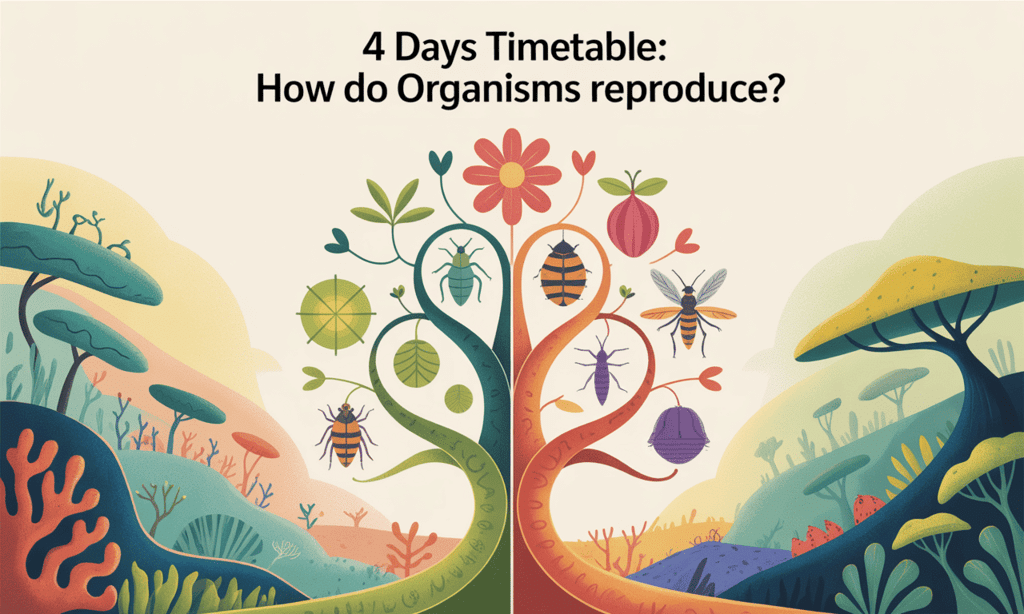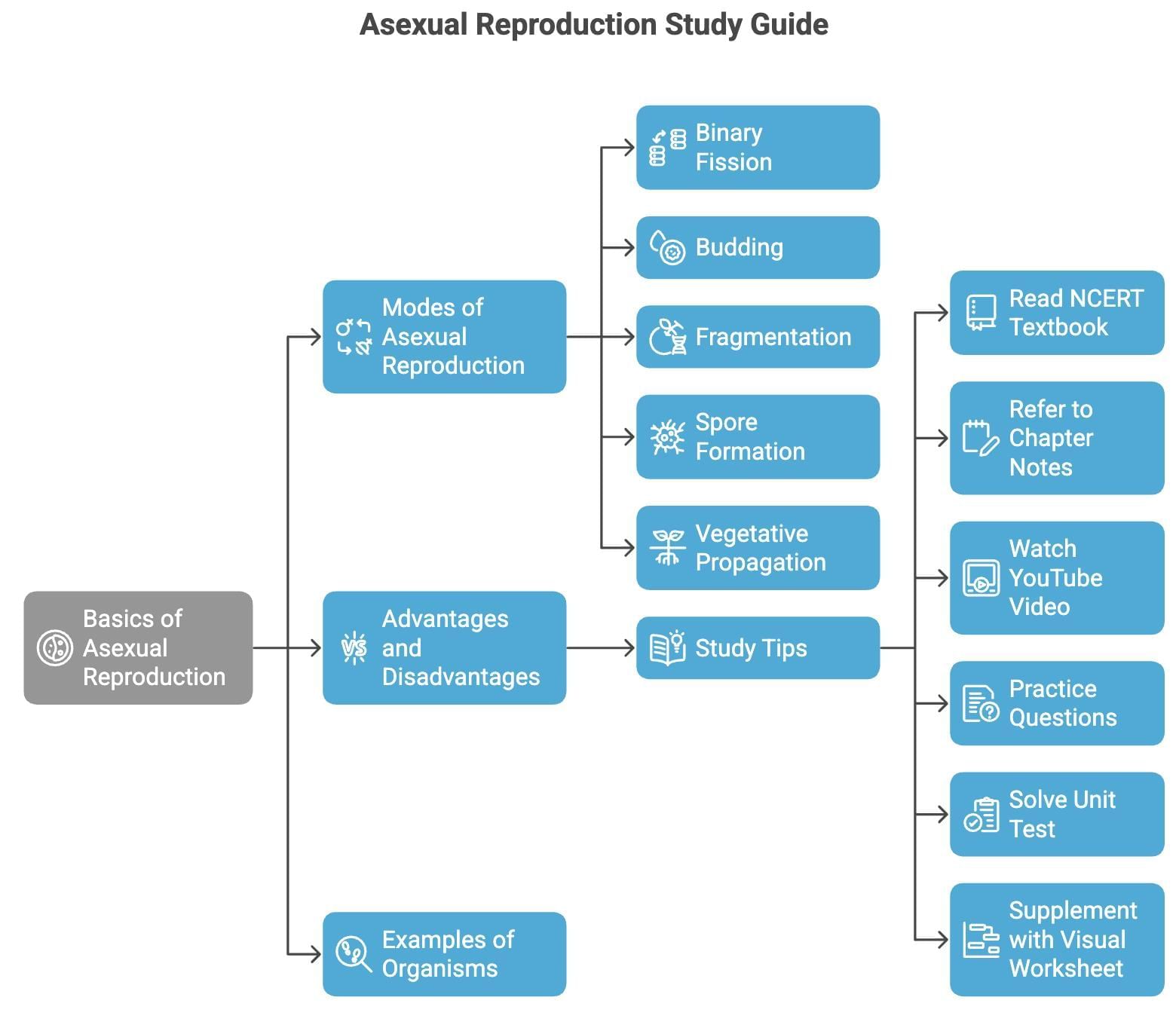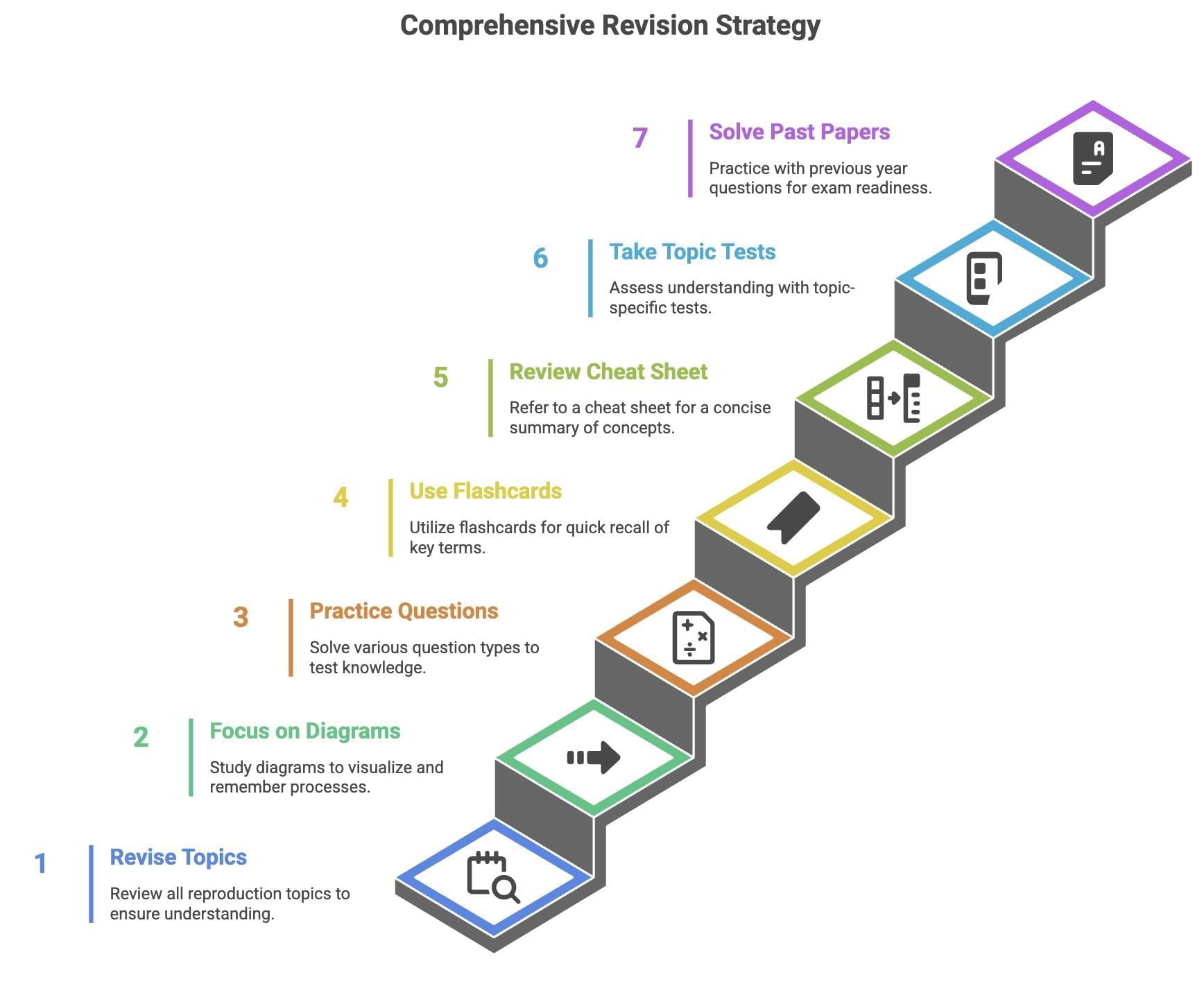4 Days Timetable: How do Organisms Reproduce? | Science Class 10 PDF Download
| Table of contents |

|
| Topics to Cover |

|
| Day 1: Asexual Reproduction |

|
| Day 3: Sexual Reproduction in Humans |

|
| Day 4: Revision |

|
 The chapter "How do Organisms Reproduce?" from Class 10 is a crucial part of your board exam preparation. Understanding the various modes of reproduction used by different organisms, as well as the concept of sexual reproduction, is essential for scoring well in your science exam. In this study plan, we will break down the chapter into manageable sections and provide you with a structured approach to cover the topics effectively.
The chapter "How do Organisms Reproduce?" from Class 10 is a crucial part of your board exam preparation. Understanding the various modes of reproduction used by different organisms, as well as the concept of sexual reproduction, is essential for scoring well in your science exam. In this study plan, we will break down the chapter into manageable sections and provide you with a structured approach to cover the topics effectively.
You can adjust the timetable based on your pace, but try to follow the pattern of covering the topics in the suggested sequence for the best results. Remember that the key to success in the board exams is not just reading but also practicing and revising. Let's get started!
Topics to Cover
Before we begin, let's outline the key topics in the chapter:
- Asexual Reproduction
- Sexual Reproduction in Plants
- Sexual Reproduction in Humans
Day 1: Asexual Reproduction
What to Cover:
- Basics of asexual reproduction and its significance.
- Different modes of asexual reproduction: Binary fission, budding, fragmentation, spore formation, vegetative propagation.
- Advantages and disadvantages of asexual reproduction.
- Examples of organisms that reproduce asexually.
Study Tips:
- Start by reading the relevant chapters in the NCERT Textbook: How do Organisms Reproduce.
- Refer to the Chapter Notes: How do Organisms Reproduce on EduRev for concise summaries and examples.
- Watch the YouTube video Quick Revision: Asexual Reproduction on EduRev for visual explanations.
- Practice questions using Practice Questions: How do Organisms Reproduce? - 1 on EduRev.
- Solve questions from the Unit Test: How Do Organisms Reproduce? and check answers with Unit Test (Solutions): How Do Organisms Reproduce? to test your understanding.
- Supplement with Visual Worksheet: Cell Cycle for a visual overview.
 Day 2: Sexual Reproduction in Plants
Day 2: Sexual Reproduction in Plants
What to Cover:
- In-depth study of sexual reproduction in flowering plants.
- Structure and function of reproductive parts in plants (stamen, pistil).
- Processes of pollination and fertilization.
- Seed formation and dispersal mechanisms.
Study Tips:
- Review the NCERT Textbook: How do Organisms Reproduce for a comprehensive understanding.
- Study the YouTube video Sexual Reproduction In Flowering Plants on EduRev for detailed explanations.
- Explore the PPT: How do Organisms Reproduce? on EduRev for visual aids.
- Practice categorizing processes using Practice Questions: How do Organisms Reproduce? - 2.
- Test your knowledge with the Test: Sexual Reproduction In Plants on EduRev.
- Use NCERT Solutions: How do Organisms Reproduce? to clarify doubts.
Day 3: Sexual Reproduction in Humans
What to Cover:
- Understanding the human reproductive system.
- Structure and function of male and female reproductive organs.
- Processes of gamete formation, fertilization, and embryonic development.
- Role of reproductive health and contraception.
Study Tips:
- Carefully read the relevant sections of the NCERT Textbook: How do Organisms Reproduce.
- Explore the Mindmap: How do Organisms Reproduce? on EduRev for a visual summary.
- Watch the YouTube video Reproduction in Human Beings on EduRev for conceptual clarity.
- Solve Case Based Questions: How Do Organisms Reproduce? to enhance problem-solving skills.
- Practice with the Test: Reproductive System in Humans to reinforce learning.
- Review Infographics: Human Reproductive System for quick recall of key structures.
Day 4: Revision
What to Cover:
- Revise all topics: Asexual Reproduction, Sexual Reproduction in Plants, and Sexual Reproduction in Humans.
- Focus on diagrams, key terms, and processes.
- Practice solving various question types to ensure thorough preparation.
Study Tips:
- Go through the Short & Long Answer Questions: How do Organisms Reproduce? on EduRev to recapitulate key concepts.
- Test yourself with Topic Wise tests like Test: Modes of Asexual Reproduction and Test: Reproduction & Its Kinds on EduRev.
- Practice solving Very Short Questions: How do Organisms Reproduce?, Worksheet: How do Organisms Reproduce?, and Previous Year Questions: How do Organisms Reproduce? to cover all question types.
- Use Flashcards: How do Organisms Reproduce and Cheat Sheet: How do Organisms Reproduce on EduRev for quick revision.

Additional Notes:
In your Class 10 Science board exam, questions on "How do Organisms Reproduce?" often involve diagrams, processes, and applications. The best way to prepare is by solving various question types, such as those from NCERT Exemplar: How do Organisms Reproduce? and Diagram Based Questions: How do Organisms Reproduce?. Utilize EduRev resources like videos, notes, and infographics to strengthen your knowledge.
For comprehensive study materials, explore Class 10 Boards on EduRev. Specific resources for this chapter include:
Important Links:
- Class 10 Boards on EduRev
- Previous Year Questions
- NCERT Exemplar
- NCERT Solutions: How do Organisms Reproduce?
- Infographics: Reproduction
Topic-Specific Links:
- Asexual Reproduction: Quick Revision: Asexual Reproduction, Test: Modes of Asexual Reproduction
- Sexual Reproduction in Plants: Sexual Reproduction In Flowering Plants, Test: Sexual Reproduction In Plants
- Sexual Reproduction in Humans: Reproduction in Human Beings, Infographics: Human Reproductive System
By following this structured study plan and regularly testing your knowledge with the interlinked resources, you can confidently tackle the chapter on "How do Organisms Reproduce?" and excel in your Class 10 board exam.
Good luck!
|
80 videos|661 docs|80 tests
|
FAQs on 4 Days Timetable: How do Organisms Reproduce? - Science Class 10
| 1. What are the different types of organisms based on their modes of reproduction? |  |
| 2. What are the main modes of asexual reproduction in organisms? |  |
| 3. How does sexual reproduction differ from asexual reproduction? |  |
| 4. What are the advantages of sexual reproduction over asexual reproduction? |  |
| 5. What role do gametes play in sexual reproduction? |  |





















